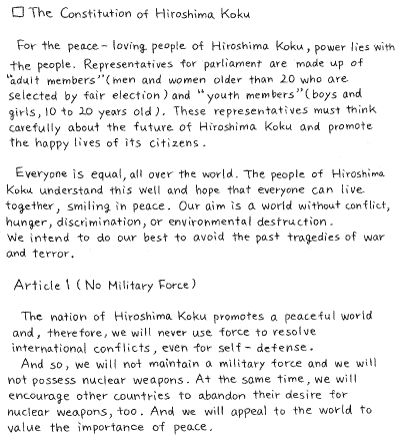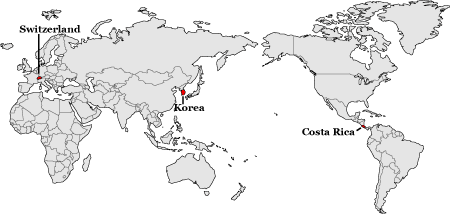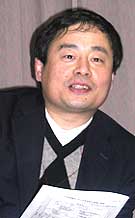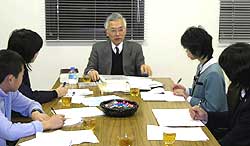A constitution for all
Junior writers draft a constitution
Our focus for the third issue is on a constitution. In the beginning, we found this a difficult topic, but the more we looked into it, the more we understood that each nation's constitution shows their strong intention to form an "ideal nation."
According to Professor Osamu Nishi of Komazawa University, about 180 countries have constitutions and 150 of these have some kind of peace-related clause. These countries, then, clearly hope to promote peace in the world.
One junior writer proposed, "Let's make a constitution for Peace Seeds!" And so we studied the constitutions of Japan and other countries. After that, we wrote a draft of our own constitution. It is just a draft, though, and we hope it can be made stronger with your ideas, too.
Youth members and adult members in discussion
The Constitution of Peace Seeds
For the peace-loving people of Peace Seeds, power lies with the people. Representatives for parliament are made up of "adult members" (men and women older than 20 who are selected by fair election) and "youth members" (boys and girls, 10 to 20 years old). These representatives must think carefully about the future of Peace Seeds and promote the happy lives of its citizens.
Everyone is equal, all over the world. The people of Peace Seeds understand this well and hope that everyone can live together, smiling in peace. Our aim is a world without conflict, hunger, discrimination, or environmental destruction. We intend to do our best to avoid the past tragedies of war and terror.
Article 1 (No Military Force)
The nation of Peace Seeds promotes a peaceful world and, therefore, we will never use force to resolve international conflicts, even for self-defense.
And so, we will not maintain a military force and we will not possess nuclear weapons. At the same time, we will encourage other countries to abandon their desire for nuclear weapons, too. And we will appeal to the world to value the importance of peace.

|
This handwritten draft was written by the junior writers.
We will never possess nuclear weapons
 |
| Junior writers discussing their draft of Peace Seeds's constitution |
The Preamble and Article 1 of the Peace Seeds Constitution were created by five junior writers after a long discussion about the constitutions of Japan and other countries.
First, the members were divided into two groups: one was in charge of examining constitutions abroad and the other was in charge of reviewing Japan's constitution. Next, each member wrote his or her own Preamble and Article 1. Finally, we put these ideas together and emphasized two issues: avoiding the use of force and advocating equality
Features of our constitution, not found in Japan's constitution, include the idea of youth as parliamentary members and a clear rejection of nuclear weapons. We believe that children should also have the opportunity to help shape the nation. And the language of government should be simple enough for children to follow.
Peace Seeds, located in a city that was destroyed by an atomic bomb, declares in its constitution that it will never possess nuclear weapons and we appeal to the world not to repeat this tragedy elsewhere.
In Japan, the 60th anniversary of the constitution has brought a debate over its revision. Removed from this debate, we discussed and drafted our constitution independently. As a result of this experience, we now have a deeper understanding of Japan's constitution. (Kyoko Niyama, 17)
Click to view the junior writers discussing their constitution for Peace Seeds.
Japan's current constitution
Japan's constitution was created in 1947 and it has never been revised. However, there are movements these days that hope to revise it. The most controversial point is the famous Article 9, which pledges "pacifism." The Liberal Democratic Party (LDP) has long aimed for a new constitution to replace the one imposed by the United States after World War II.
In November 2005, the LDP presented a draft for a new constitution. In this draft, Item 2 of Article 9, which states that "a military force will not be maintained" and "aggression by the state will not be permitted" was completely removed. Instead, it claimed the right to maintain a self-defense force with the Prime Minister as commander-in-chief as well as the use of that force for the sake of "securing our nation's peace, independence, and security."
Another party, the Democratic Party, and a newspaper company also announced their own drafts of a new constitution. As a backdrop to these events, Japan is now facing the challenges of the Self-Defense Force's participation in the Iraq War and North Korea's nuclear development.
At the same time, a different movement to protect the constitution became active. These supporters of the constitution set up branches throughout Japan and campaigned to preserve Japan's constitution, particularly Article 9.
Although the revision of the constitution is now in the spotlight, many people still don't seem interested in this matter. I think we all have to consider what sort of role Japan should play in the world today. (Kyoko Niyama, 17)
Examining other countries

| ||
 Switzerland a neutral country with a military force Switzerland is a neutral state. Its permanent neutrality was approved by the Congress of Vienna in 1815. However, Switzerland maintains a military force to protect the country. According to the constitution, "The military serves to prevent war and to maintain peace; it defends the country and protects its population; and it lends support to the civil authorities." It also clearly states that the military isn't permitted to attack other countries. Every Swiss male must perform military service, but for females, military service is voluntary. The fact that women have this choice is a unique point. (Rikako Okada, 16) |
 Korea A military is maintained for national security. Korea, Japan's neighbor, maintains a military, but its constitution affirms that the armed forces must not be used to invade other countries. Their constitution states: The idea that the military will be used only for national security is emphasized. (Rikako Okada, 16) |
 Costa Rica Approval for Iraq war was judged "against the constitution" Costa Rica, famous for its "Peace Constitution," vows not to have a military force. In 1949, when its civil war ended, the country decided that "the military as a permanent institution is abolished." Today, they have only a police force to maintain order in the country. Also, in 1983, they pronounced their neutrality in international conflicts. However, in 2003, the Costa Rican government announced its approval of America's attack on Iraq. Consequently, a university student took legal action, claiming it was a violation of the constitution and the nation's spirit of political neutrality. He sued the government in the country's "constitutional court." The following year, the court ruled that the government's stance was unconstitutional. And so the government withdrew its support for the Iraq War. In this way, the spirit of the Costa Rican constitution was protected. (Yutaro Honkawa, 17) |
Takashi Monden, a professor of Hiroshima University Law School, researches foreign laws and Japan's constitution
 |
| Professor Monden responding to the questions of junior writers |
He says, "A constitution is the foundation on which we form a country. However, in a changing world, something may occur which conflicts with the philosophy of the original constitution. Even in such situations, it is important to respect the constitution and seek to realize the kind of society this philosophy advocates."
In Costa Rica, a university student claimed that the government's support for America in the Iraq War was a violation of the constitution and he eventually won the case. Costa Rica has a special court, called the Constitutional Court, which determines whether something is constitutional or not. Professor Monden points out that in Costa Rica, this judicial system strengthens the constitution and that Japan lacks this feature. He added that Germany has a similar system.
Professor Monden suggests that, when looking at other constitutions, Article 9 of Japan's constitution stands out. It vows not to maintain a military force and it completely renounces war. These ideas reflect the experience of Japan in World War II. Professor Monden believes Japan should be proud of Article 9 and share its values more actively with the world.
I asked him to take a look at our constitution for Peace Seeds. He said, "It's an interesting document. If you can include more specific ideas on how to encourage other countries to abandon their desire for nuclear weapons while maintaining the nation's security, this constitution would be even more persuasive." (Masahiro Mikoshi, 14)
Atsutaka Hiroshima, a lawyer in the Hiroshima Bar Association Creating the "Constitution Musical"
 |
| Mr. Hiroshima, a lawyer, speaking with junior writers about peace |
"When all countries support one another, we can be happy and at peace," says Atsutaka Hiroshima, a lawyer. He writes the script for the "Constitution Musical," which has been performed by citizens of Hiroshima every May for 14 years. His goal is to inform the public about the constitution through a fun, but meaningful, performance.
These days, he focuses on Article 9 to oppose the movement to revise the constitution. He believes Article 9 is the heart of Japan's constitution and explains, "Our constitution renounces war completely. This philosophy must one day be accepted more universally in the world."
Although pondering the constitution can be difficult, it's important to see that this issue involves us, too. Mr. Hiroshima ended our interview with the words, "I plan to continue presenting this musical with the hope of realizing a more peaceful world." (Minako Iwata, 13)
- The right of collective self-defense
A country has the right to defend an ally if it is attacked.
- Permanently neutral country
A country that declares it will never attack another country or take part in a war involving other countries.